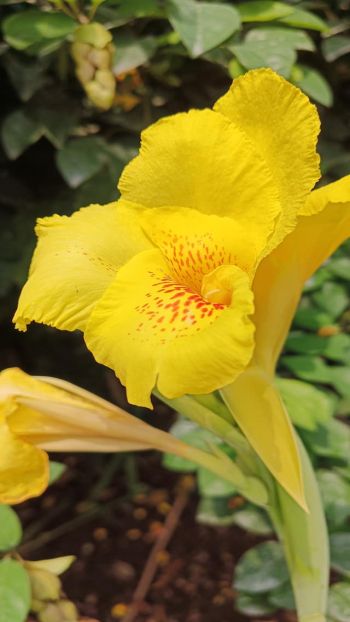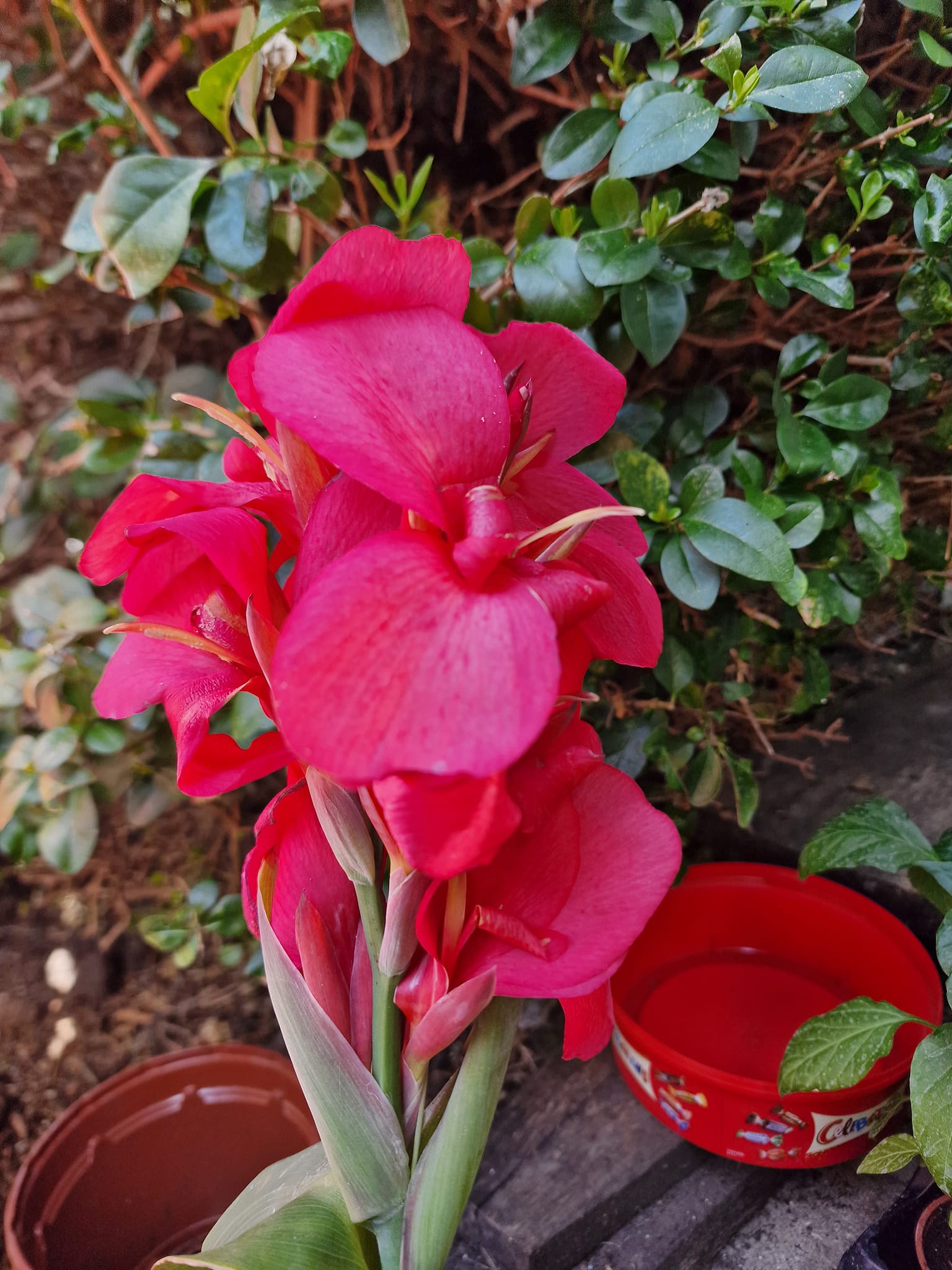
Canna lily also simplified as Canna, is a genus of flowering plants native to tropical and subtropical regions of the Americas. I personally love this plant for its huge bloom and colorful petals that attract birds and bees.
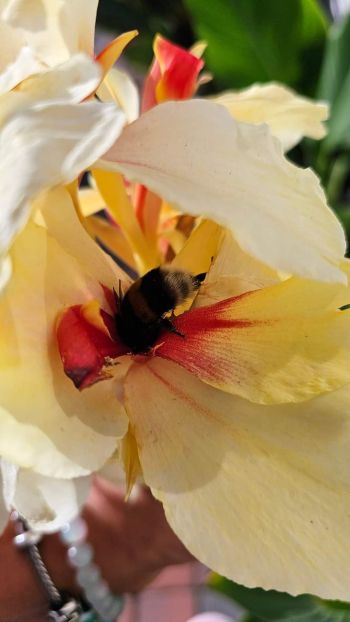
In this article, I will share my growing experience with Canna Lily and also guide you on growing, pruning, propagating, watering, etc.
I love this plant as it attracts small birds like hummingbirds.
Canna Lily Information
| Scientific Name | Canna |
|---|---|
| Common Name | Canna Lily |
| Type | Herbaceous Perennial |
| Planting Season | Plant it in spring or just after the winter |
| Native To | Tropical and Subtropical Americas |
| Height | Varies (typically a few to over six feet) |
| Foliage | Broad, paddle-shaped leaves; Green, Burgundy, Variegated |
| Flowers | Large, Lily-like blooms; Red, Orange, Yellow, Pink |
| Growing Conditions | Full Sun to Partial Shade; Well-Drained Soil; Regular Watering |
| Propagation | Division of Rhizomes (Rootstalk) and from seeds also |
| Landscaping Uses | Borders, Focal Points, Containers |
| Maintenance | Regular Watering, Balanced Fertilizer, Deadheading |
| Winter Care | In Colder Climates: Lift and Store Rhizomes |
| Notable Features | Tropical Appearance, Vibrant Foliage, Exotic Blooms |
How to grow it?
We can grow canna lily:
- In a pot or container.
- Can be grown in the ground.
You can also grow canna lily from seeds if you wish.
Grow canna lily in a pot
We can grow a canna lily plant in a pot but make sure the pot is large enough.
Pot selection:
- Opt for a spacious and sturdy pot.
- Adequate drainage holes are required. It will help to prevent root rotting
Soil Preparation:
- Utilize a well-draining potting mix enriched with organic matter.
- Aim for a slightly acidic to neutral soil with a pH ranging from 6.0 to 7.0.
Planting: After filling the container with soil (Giving space or a hole in the center), it's time to plant. Plant your canna lily in the hole, and tighten the soil. In the end, add some water.
Repotting: Don't forget to repot every 2 years to give fresh soil (As day by day the fertilization in a pot decreases).
Note: Make sure that you put it indoors in heavy winter to overwinter your lilies.
Grow canna lily in the ground
If you wish you can plant it in the ground too. I personally love this one as I have a lot of outdoor spaces.
Canna lily does not demand huge sunlight. So you can plant it in shady places also. But they need moist soil almost all the time. In my native land, this plant automatically grows beside the drains. (Because those places have moist soil all the year)
If the soil is prepared and moist, you can directly plant it there. It does not die easily.
Fertilizer
Balanced fertilizer is good for this flowering plant. Slow-release fertilizers are good for canna lilies.
Support
Canna lily can grow up to 6 or 7 feet. If you see bending at the top then you can use support to prevent them from toppling over.
You can use a solid stick to give proper support.
Winter care for canna lilies
- In regions with a warm climate, Canna lilies tend to exhibit perennial characteristics, allowing them to thrive in the ground year-round.
- In colder climates, it is advisable to trim back the foliage after the initial frost and shield the planting area with a substantial layer of mulch. This precautionary measure safeguards the Canna lily rhizomes from freezing temperatures during the winter months.
Division
Every 2-3 years, consider dividing the Canna lilies to rejuvenate the plants and control their size.
Propagation of Canna Lily
The most commonly used propagation method is using Rhizomes (Also known as creeping rootstalk). If you uproot a plant of canna lily, you will see something like ginger or turmeric. That is Rhizome.
But we can also use seeds to propagate Canna lilies.
If you are curious to learn how to do that you can check my previous article on How to Germinate Canna Lily Seeds
Pruning
It's important to prune the unhealthy and yellow leaves to maintain proper growth. Also, remove the dead flowers from the stem to increase the blooms.
If you notice any unusual growth you can remove some of your plants from the rootstalk.
Some facts about Canna Lily
Here's a list of questions that are asked on the internet widely:
Are canna lilies perennials?
Yes, they can live more than 2 years. It's a perennial plant.
Are canna lilies poisonous to dogs?
No, they are not poisonous and do not harm dogs or any pets. They are not harmful to children also. But do not ingest it, as it might cause health issues.
Do canna lilies spread?
Yes, it can spread rapidly but not as aggressively as other grass-type plants.
How to deadhead canna lilies?
Deadheading is the process of removing spent or faded flowers from plants. If you do so, it will reward you with more flowers.
After the flowers past their prime, you can start deadheading. Follow the flower stem down to where it connects to the main stalk or stem of the plant.
Locate a node on the flower stem, which is a small bump or swelling where leaves or buds emerge. Using your pruning shears or scissors, make a clean cut just above the node. This is typically a few inches below the faded flower.
When do canna lilies bloom?
It blooms in the Midsummer.
do deer eat canna lilies?
It's known as a deer resistant and deer does not eat it.
Different colors of Canna Lily - Photos
There are multiple types of canna lilies out there. If I describe each one here, this article will be very long. I will share in-depth knowledge on this in another article.
For now, I am showing some major varieties of this lily which I have grown till now.
I am not mentioning the scientific name or any complicated name that is hard to remember. Just showing with the color names.
Orange or peach-colored canna lily
This orange cana lily is hard to find in the local area.
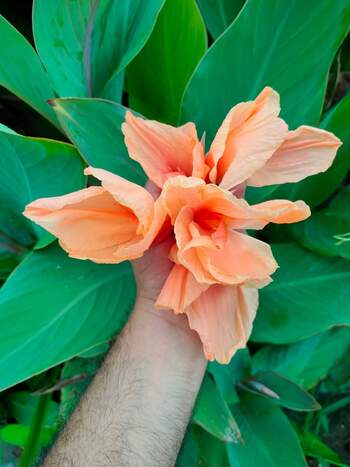
White canna lily
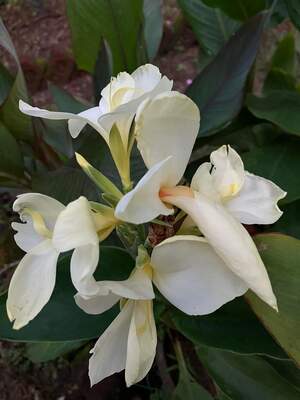
Green leaves and white flower is really a nice combination.
Greenish Canna Lily
Take a look at this lily. I guess white and green are mixed.
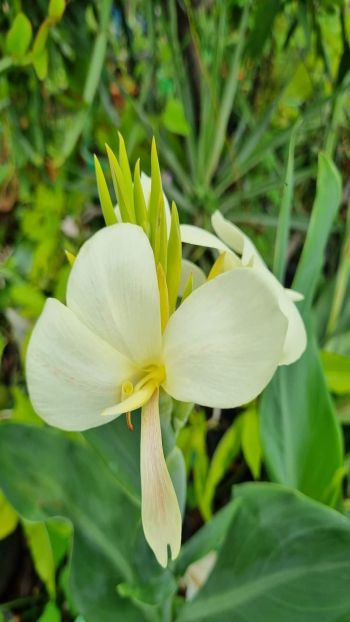
Yellow canna lily
